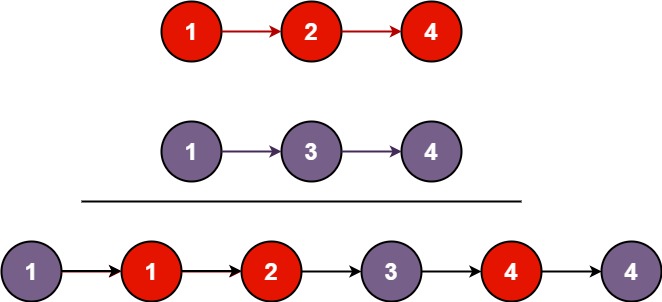Description
You are given the heads of two sorted linked lists list1 and list2.
Merge the two lists in a one sorted list. The list should be made by splicing together the nodes of the first two lists.
Return the head of the merged linked list.
Example 1:

Input: list1 = [1,2,4], list2 = [1,3,4] Output: [1,1,2,3,4,4]
Example 2:
Input: list1 = [], list2 = [] Output: []
Example 3:
Input: list1 = [], list2 = [0] Output: [0]
Constraints:
- The number of nodes in both lists is in the range
[0, 50]. -100 <= Node.val <= 100- Both
list1andlist2are sorted in non-decreasing order.
Code
Time Complexity: , Space Complexity:
Direct Pointer
C:
/**
* Definition for singly-linked list.
* struct ListNode {
* int val;
* struct ListNode *next;
* };
*/
struct ListNode* mergeTwoLists(struct ListNode* list1, struct ListNode* list2) {
struct ListNode* dummy = malloc(sizeof(struct ListNode));
struct ListNode* res = dummy;
while(list1 && list2) {
if(list1->val < list2->val) {
dummy->next = list1;
list1 = list1->next;
} else {
dummy->next = list2;
list2 = list2->next;
}
dummy = dummy->next;
}
if(list1) {
dummy->next = list1;
} else {
dummy->next = list2;
}
return res->next;
}C++:
/**
* Definition for singly-linked list.
* struct ListNode {
* int val;
* ListNode *next;
* ListNode() : val(0), next(nullptr) {}
* ListNode(int x) : val(x), next(nullptr) {}
* ListNode(int x, ListNode *next) : val(x), next(next) {}
* };
*/
class Solution {
public:
ListNode* mergeTwoLists(ListNode* list1, ListNode* list2) {
ListNode* dummy = new ListNode(0);
ListNode* curr = dummy;
while(list1 && list2) {
if(list1->val < list2->val) {
curr->next = new ListNode(list1->val);
list1 = list1->next;
} else {
curr->next = new ListNode(list2->val);
list2 = list2->next;
}
curr = curr->next;
}
if(list1) {
curr->next = list1;
} else if (list2) {
curr->next = list2;
}
return dummy->next;
}
};Pointer to Pointer (Indirect Pointer)
想避免組態暫時節點的空間 (即上方程式碼中的 malloc),該怎麼做?運用上述 indirect pointer 的技巧(因為 indirect pointer 只需要改變 address,所以不需要用到 malloc):
C:
/**
* Definition for singly-linked list.
* struct ListNode {
* int val;
* struct ListNode *next;
* };
*/
struct ListNode* mergeTwoLists(struct ListNode* list1, struct ListNode* list2) {
struct ListNode* head;
struct ListNode** indirect = &head;
while(list1 && list2) {
if(list1->val < list2->val) {
*indirect = list1;
list1 = list1->next;
} else {
*indirect = list2;
list2 = list2->next;
}
indirect = &(*indirect)->next;
}
if(list1) {
*indirect = list1;
} else {
*indirect = list2;
}
return head;
}C++:
/**
* Definition for singly-linked list.
* struct ListNode {
* int val;
* ListNode *next;
* ListNode() : val(0), next(nullptr) {}
* ListNode(int x) : val(x), next(nullptr) {}
* ListNode(int x, ListNode *next) : val(x), next(next) {}
* };
*/
class Solution {
public:
ListNode* mergeTwoLists(ListNode* list1, ListNode* list2) {
ListNode* head = nullptr;
ListNode** indirect = &head;
while(list1 && list2) {
if(list1->val < list2->val) {
*indirect = list1;
list1 = list1->next;
} else {
*indirect = list2;
list2 = list2->next;
}
indirect = &((*indirect)->next);
}
if(list1)
*indirect = list1;
if(list2)
*indirect = list2;
return head;
}
};